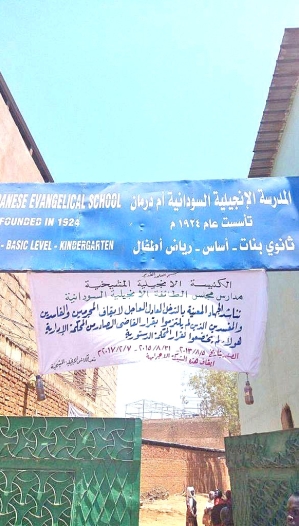
A years-long Islamist attempt to seize a Christian school in Sudan continued this month even as people displaced by war have taken refuge in the facility, sources said.
An Islamic business interest sent three Muslims who forcefully entered the embattled Evangelical School of Sudan, in Omdurman across the Nile River from Khartoum, on Sept. 3 and threatened hundreds of mostly Christian people displaced by internal war, telling them to leave the compound, said an area church leader whose name was withheld for security reasons.
The intruders made their way to the office of the headmaster of the school, which belong to the Sudan Presbyterian Evangelical Church (SPEC), and broke the office door, the church leader said. Without giving a deadline, the intruders threatened to take the facility by force, he said.
The institution suffered numerous attacks during the regime of deposed President Omar al Bashir, mainly raids by supporters of the Muslim businessman who has sought to seize the land by force accompanied by police.
On April 3, 2017, a church leader was stabbed while defending Christian women at the facility during an attempt by assailants to take it over; elder Younan Abdullah Kambu of the nearby Bahri Evangelical Church later died in a hospital.
During the same raid, elder Ayoub Kamama was also stabbed in the chest and the hand as he tried to snatch a knife from one of the assailants.
Conditions in Sudan have worsened since civil war that broke out between the paramilitary Rapid Support Forces (RSF) and the Sudanese Armed Forces (SAF) in April 2023. Sudan registered increases in the number of Christians killed and sexually assaulted and Christian homes and businesses attacked, according to Open Doors’ 2025 World Watch List (WWL) report.
“Christians of all backgrounds are trapped in the chaos, unable to flee. Churches are shelled, looted and occupied by the warring parties,” the report stated.
Both the RSF and the SAF are Islamist forces that have attacked displaced Christians on accusations of supporting the other’s combatants.
The conflict between the RSF and the SAF, which had shared military rule in Sudan following an October 2021 coup, has terrorized civilians in Khartoum and elsewhere, killing tens of thousands and displacing more than 11.9 million people within and beyond Sudan’ borders, according to the U.N. Commissioner for Human Rights (UNCHR).
The SAF’s Gen. Abdelfattah al-Burhan and his then-vice president, RSF leader Mohamed Hamdan Dagalo, were in power when civilian parties in March 2023 agreed on a framework to re-establish a democratic transition the next month, but disagreements over military structure torpedoed final approval.
Burhan sought to place the RSF – a paramilitary outfit with roots in the Janjaweed militias that had helped former strongman Bashir put down rebels – under the regular army’s control within two years, while Dagolo would accept integration within nothing fewer than 10 years.
Both military leaders have Islamist backgrounds while trying to portray themselves to the international community as pro-democracy advocates of religious freedom.
Sudan was ranked No. 5 among the 50 countries where it is most difficult to be a Christian in Open Doors’ 2025 World Watch List (WWL), down from No. 8 the prior year. Sudan had dropped out of the top 10 of the WWL list for the first time in six years when it first ranked No. 13 in 2021.
Following two years of advances in religious freedom in Sudan after the end of the Islamist dictatorship under Bashir in 2019, the specter of state-sponsored persecution returned with the military coup of Oct. 25, 2021. After Bashir was ousted from 30 years of power in April 2019, the transitional civilian-military government had managed to undo some sharia (Islamic law) provisions. It outlawed the labeling of any religious group “infidels” and thus effectively rescinded apostasy laws that made leaving Islam punishable by death.
With the Oct. 25, 2021 coup, Christians in Sudan feared the return of the most repressive and harsh aspects of Islamic law.
The U.S. State Department in 2019 removed Sudan from the list of Countries of Particular Concern (CPC) that engage in or tolerate “systematic, ongoing and egregious violations of religious freedom” and upgraded it to a watch list. Sudan had previously been designated as a CPC from 1999 to 2018.
In December 2020, the State Department removed Sudan from its Special Watch List.
The Christian population of Sudan is estimated at 2 million, or 4.5 percent of the total population of more than 43 million.






